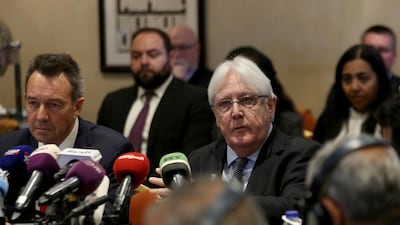Yemen’s government and the Houthi rebels have resumed talks in Switzerland on a prisoner exchange that was part of a peace deal reached nearly two years ago.
The exchange of thousands of prisoners was one of a series of confidence-building measures agreed upon in Stockholm that were supposed to lay the groundwork for a political solution to the conflict, now in its sixth year.
Martin Griffiths, the United Nations envoy to Yemen, said delegates from the internationally recognised government sat down in Geneva with the Iran-backed rebels for talks co-chaired by the International Committee of the Red Cross.
Mr Griffiths urged the parties to “release detainees swiftly” and “bring relief to thousands of Yemeni families”.
A deal to trade 15,000 prisoners was considered a breakthrough during 2018 peace talks in Sweden. The negotiations produced a sequence of confidence-building measures, including a ceasefire in the strategic port city of Hodeidah. But ongoing military offensives across the country and deep-seated mutual distrust has repeatedly delayed the exchange.
Occasional releases of dozens of prisoners over the past two years have served as gestures of good faith, stoking hopes the factions would implement what the UN has described as the war’s “first official large-scale” exchange. The two sides committed earlier this year to swap more than 1,400 detainees
The peace efforts gained more international attention as the coronavirus pandemic threatened Yemen's devastated health system. However, fighting continues to rage as the rebels push into the oil-rich government stronghold of Marib.
Yara Khawaja, a spokeswoman for the ICRC in Yemen, said she welcomed the negotiations “for the sake of the families waiting for loved ones to return home”.
“It’s in the hands of the parties to the conflict to bring long-lasting positive change,” she said.
The office of the UN envoy said it was unclear how long the Geneva talks would take.
Yemen’s war erupted in late 2014, when the Iran-backed Houthis seized the capital, Sanaa, and much of the country’s north. A Saudi-led military coalition intervened the following year in an effort to restore President Abdrabu Mansur Hadi's government to power.
A source close to Yemen's presidency told Agence France-Presse that the talks in Switzerland would "lay out the final touches" after agreement was reached with the ICRC "on all logistical arrangements".
The president's brother, Gen Nasser Mansour Hadi, along with 19 Saudis and politicians and journalists, would be among those released, he said.
A former senior intelligence official, the general has been held by the rebels ever since they overran Sanaa.
The war has killed more than 112,000 people, according to The Armed Conflict Location & Event Data Project, and pushed millions to the brink of famine.
Countries recognising Palestine
France, UK, Canada, Australia, Portugal, Belgium, Malta, Luxembourg, San Marino and Andorra
AL%20BOOM
%3Cp%20style%3D%22text-align%3Ajustify%3B%22%3E%26nbsp%3B%26nbsp%3B%26nbsp%3BDirector%3AAssad%20Al%20Waslati%26nbsp%3B%3C%2Fp%3E%0A%3Cp%20style%3D%22text-align%3Ajustify%3B%22%3E%0DStarring%3A%20Omar%20Al%20Mulla%2C%20Badr%20Hakami%20and%20Rehab%20Al%20Attar%0D%3Cbr%3E%0D%3Cbr%3EStreaming%20on%3A%20ADtv%0D%3Cbr%3E%0D%3Cbr%3ERating%3A%203.5%2F5%0D%3Cbr%3E%0D%3Cbr%3E%3C%2Fp%3E%0A
Kanguva
Director: Siva
Stars: Suriya, Bobby Deol, Disha Patani, Yogi Babu, Redin Kingsley
Tearful appearance
Chancellor Rachel Reeves set markets on edge as she appeared visibly distraught in parliament on Wednesday.
Legislative setbacks for the government have blown a new hole in the budgetary calculations at a time when the deficit is stubbornly large and the economy is struggling to grow.
She appeared with Keir Starmer on Thursday and the pair embraced, but he had failed to give her his backing as she cried a day earlier.
A spokesman said her upset demeanour was due to a personal matter.
Key facilities
- Olympic-size swimming pool with a split bulkhead for multi-use configurations, including water polo and 50m/25m training lanes
- Premier League-standard football pitch
- 400m Olympic running track
- NBA-spec basketball court with auditorium
- 600-seat auditorium
- Spaces for historical and cultural exploration
- An elevated football field that doubles as a helipad
- Specialist robotics and science laboratories
- AR and VR-enabled learning centres
- Disruption Lab and Research Centre for developing entrepreneurial skills
The%C2%A0specs%20
%3Cp%3E%3Cstrong%3EEngine%3A%20%3C%2Fstrong%3E4.4-litre%2C%20twin-turbo%20V8%0D%3Cbr%3E%3Cstrong%3ETransmission%3A%20%3C%2Fstrong%3Eeight-speed%20auto%0D%3Cbr%3E%3Cstrong%3EPower%3A%20%3C%2Fstrong%3E617hp%0D%3Cbr%3E%3Cstrong%3ETorque%3A%20%3C%2Fstrong%3E750Nm%0D%3Cbr%3E%3Cstrong%3EPrice%3A%20%3C%2Fstrong%3Efrom%20Dh630%2C000%0D%3Cbr%3E%3Cstrong%3EOn%20sale%3A%20%3C%2Fstrong%3Enow%3C%2Fp%3E%0A
PROFILE OF HALAN
Started: November 2017
Founders: Mounir Nakhla, Ahmed Mohsen and Mohamed Aboulnaga
Based: Cairo, Egypt
Sector: transport and logistics
Size: 150 employees
Investment: approximately $8 million
Investors include: Singapore’s Battery Road Digital Holdings, Egypt’s Algebra Ventures, Uber co-founder and former CTO Oscar Salazar
UAE currency: the story behind the money in your pockets
Brief scores:
Toss: Sindhis, elected to field first
Kerala Knights 103-7 (10 ov)
Parnell 59 not out; Tambe 5-15
Sindhis 104-1 (7.4 ov)
Watson 50 not out, Devcich 49
The specs
Engine: 4.0-litre V8 twin-turbocharged and three electric motors
Power: Combined output 920hp
Torque: 730Nm at 4,000-7,000rpm
Transmission: 8-speed dual-clutch automatic
Fuel consumption: 11.2L/100km
On sale: Now, deliveries expected later in 2025
Price: expected to start at Dh1,432,000
Company Profile
Name: Thndr
Started: 2019
Co-founders: Ahmad Hammouda and Seif Amr
Sector: FinTech
Headquarters: Egypt
UAE base: Hub71, Abu Dhabi
Current number of staff: More than 150
Funds raised: $22 million
BMW M5 specs
Engine: 4.4-litre twin-turbo V-8 petrol enging with additional electric motor
Power: 727hp
Torque: 1,000Nm
Transmission: 8-speed auto
Fuel consumption: 10.6L/100km
On sale: Now
Price: From Dh650,000

